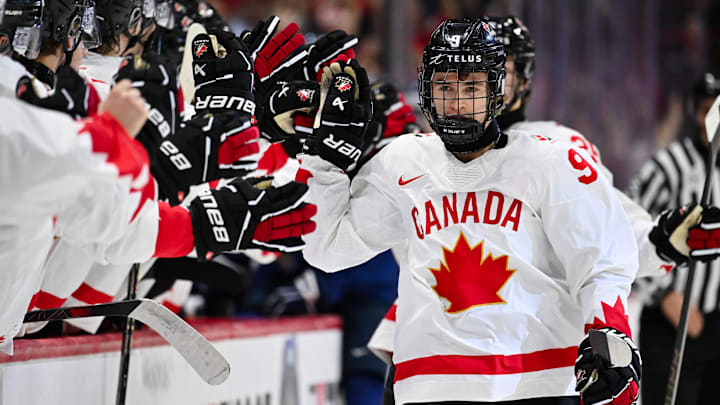Generational hockey talent Gavin McKenna is expected to sign with Penn State men's hockey. The left winger from Whitehorse, Canada is projected to be the No. 1 overall selection in the 2026 NHL Draft.
Over the weekend of July 4, McKenna visited Michigan State and Penn State, his two finalists. Between the two, the Nittany Lions put a much more valuable offer on the table. According to Mike McMahon, Penn State offered McKenna around $700,000, about $400,000 more than the Spartans.
Penn State’s monetary offer was in the neighborhood of 700K. Michigan State’s was in 200-300K range per Mike. The package McKenna will receive from Penn State will be the richest in college hockey history. #HockeyValley https://t.co/zEK3YO2qVg
— Hockey Valley Horizons (@HVHorizonsPSU) July 8, 2025
The Nittany Lions are certainly banking in on winning on a national title. According to DraftKings, Penn State has the highest odds to win the title in 2026. They're coming off their first Frozen Four appearance in program history, have a first-round defenseman Jackson Smith also coming in, and now have a future NHL all-time great on their roster.
McKenna has everything: size, speed, skill, and mentality. He recorded 129 points on 41 goals and 188 assists over 56 games. In the postseason with Medicine Hat of the Western Hockey League, he added 38 points on nine goals and 29 assists in 16 games and led the Tigers to a WHL championship title.
The term "generational talent" isn't used loosely in hockey. The 17-year-old is considered to be a future Sidney Crosby, Connor McDavid, Alex Ovechkin, or Wayne Gretsky. He's a player who, when more of them come by, schools are going to want to buy in on. Penn State set the standard, and NCAA players can start to consider staying in college hockey longer rather than rush to sign a contract with the pros. Players can fulfill their college eligibility and this will, in turn, keep the NCAA at an elite level of competitiveness for longer.
Not many college athletes sign with the intent of completing a four-year plan. Most take about two to three years before heading to the NHL. On top of having these elite players for longer, the new NCAA eligibility rules that allow Canadian Hockey League players to play for college teams unlocks a whole other side of talent and development. McKenna's coming to Happy Valley from the CHL.
These players perform at a higher junior level, even if they aren't a "generational talent," compared to the United States Hockey League. The jump from the USHL to NCAA is tougher than the NCAA to the pros. The CHL is a direct pathway to the NHL, so the difference between USHL and CHL players will be evident at the college level. It's typical for players to have an adjustment period as freshmen out of the USHL, the jump in their game breaking out at the end of their first year or as sophomores. CHL skaters will have that development advantage. The combination of more developed players and keeping valuable ones for longer will make the NCAA a highly competitive and talented level.
But now, there's a monetary advantage at the NCAA level if schools are willing to put the big bucks into it. However, not every school has those funds to allocate for just one hockey player, especially since football is the primary driving sport of the NCAA. Penn State, though, is certainly in a good position to cash in on these elite talents.
